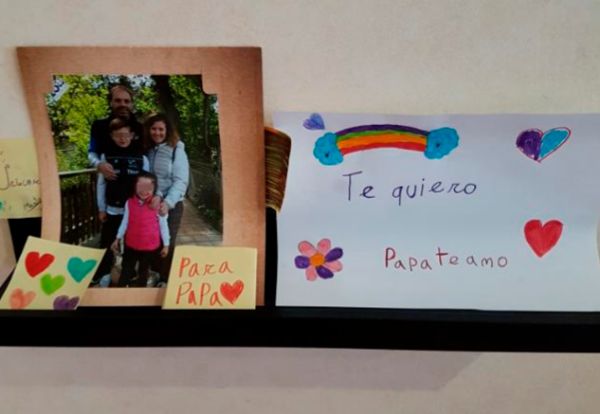- Breaking News - All About Coronavirus
For three weeks, Alejandro Martínez has lived alone in a room with aseptic decoration. The only thing that distinguishes this impersonal room from any other is a family photo placed on a shelf next to a colorful children's drawing that reads: «I love you. Dad I love you » . "It gives me a lot of strength to continue fighting day by day," confesses this nurse from the Infanta Sofía Hospital in Madrid, self-confined by the coronavirus crisis.
Like him, another 1,600 toilets sleep these days in 21 hotels in the region that have given up their empty tourist establishments to accommodate those who for various reasons do not want or cannot return to their homes after the end of their workday. The government of Isabel Díaz Ayuso, who according to the point of her team personally promoted this initiative in the face of the evolution of the pandemic, contemplates the expansion of the number of available places because "there is a great demand".
When the number of admissions for Covid-19 began to multiply in the Infanta Sofía, Alejandro was still living at home in Alcorcón with his wife, who has asthma, and their two children, Iván, 13, and Marta, seven . He had stopped giving them kisses, the little girl did not understand why she could only hug him by the knees, he put on a mask and gloves to enter his own house where he no longer knew what to touch and that no, the older one coughed one day .. And then he made the difficult decision.
Are you afraid of contracting the disease that you help fight with your work? «Man, you think, that you can get it, because the risk is very great, and that it can be complicated, as it happens to other patients, but it is our job, we are professionals and we dedicate ourselves to this. Really the biggest fear is that you can infect your family » .
So the supervising nurse of the Psychiatry service at the Infanta Sofía Hospital packed their bags and moved to the B&B Aeropuerto T4 hotel, which despite its name is located in the town of San Sebastián de los Reyes, just five minutes by car from its health Center. The first night there were only three guests and they were able to have dinner at the community restaurant keeping the security distances; Now it is full and food is brought up to the room in a plastic bag .
Alejandro spends his partial confinement reading, watching series, trying to avoid the news and communicating by video conference with his own. He only returns to his true home once a week, on Saturday mornings, to do laundry there -the stay does not include this service- and he already stays to eat, but he does so at a table separate from his wife and children.
"Like everything, you more or less get used to it, but the first day I entered the hotel room it fell on me ... I thought: 'I'm coming, but I don't know for how long.' At least now we are seeing the light a little because the influx of patients in the hospital has begun to drop. ”
The Ministry of Health launched this alternative accommodation project for professionals through the General Directorate for Humanization and Patient Care and in collaboration with the Madrid Hotel Business Association. The companies give up their establishments voluntarily without financial consideration and the regional government provides the half-board system - which is being covered by donations - and assumes the cost of cleaning and disinfection.
The measure will continue until the coronavirus emergency is terminated and professionals such as Alejandro Martínez can return to their homes to receive the "I love you" without having to settle for seeing them drawn on the ledge of an impersonal room.
According to the criteria of The Trust Project
Know moreHistoriesThe first extubado of the La Zarzuela hospital speaks: "I thought I was not going to wake up"
Covid-19Solidarity Landlords: "I forgive you the rent while the state of alarm lasts"
ConfinementThe success of retro sport during the coronavirus: "People need their drug dose"

